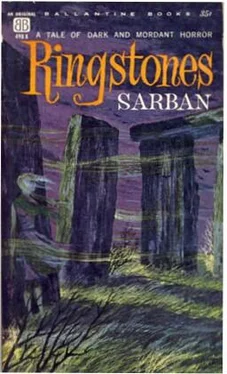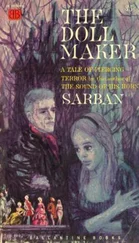Сарбан - Ringstones
Здесь есть возможность читать онлайн «Сарбан - Ringstones» весь текст электронной книги совершенно бесплатно (целиком полную версию без сокращений). В некоторых случаях можно слушать аудио, скачать через торрент в формате fb2 и присутствует краткое содержание. Жанр: Ужасы и Мистика, на английском языке. Описание произведения, (предисловие) а так же отзывы посетителей доступны на портале библиотеки ЛибКат.
- Название:Ringstones
- Автор:
- Жанр:
- Год:неизвестен
- ISBN:нет данных
- Рейтинг книги:3 / 5. Голосов: 1
-
Избранное:Добавить в избранное
- Отзывы:
-
Ваша оценка:
- 60
- 1
- 2
- 3
- 4
- 5
Ringstones: краткое содержание, описание и аннотация
Предлагаем к чтению аннотацию, описание, краткое содержание или предисловие (зависит от того, что написал сам автор книги «Ringstones»). Если вы не нашли необходимую информацию о книге — напишите в комментариях, мы постараемся отыскать её.
Ringstones — читать онлайн бесплатно полную книгу (весь текст) целиком
Ниже представлен текст книги, разбитый по страницам. Система сохранения места последней прочитанной страницы, позволяет с удобством читать онлайн бесплатно книгу «Ringstones», без необходимости каждый раз заново искать на чём Вы остановились. Поставьте закладку, и сможете в любой момент перейти на страницу, на которой закончили чтение.
Интервал:
Закладка:
On the whole I remember feeling well content when my first day's work ended at the children's supper time. I went up to my room and surveyed my day. It had been a strenuous one, and there was one more strenuous thing yet to do. I had to meet Nuaman's challenge. Luckily I had sent on all my clothes to Ringstones. I put on my gym shorts and a jersey and a pair of gym shoes and slipped out into the park while the children were still at supper and Dr Ravelin was still in his study.
I found the oak tree again without difficulty. I paced back about as far as Nuaman had done and studied the thing. I had never attempted anything quite like it before, and I could see that it needed good judgment if I was not to bungle it or hurt myself. Then, as I looked at the trunk of the tree, I saw there was something that made it a little easier: a slight, rounded projection at about the six foot mark. That, I decided, after examining it at close quarters, was where Nuaman had got his foothold. I drew back again and went at it. I did better than I expected; I got my foot on the projecting knob but missed my grip on the branch above me. Still, I sprang backwards and landed on my feet without damage. I timed it better the next time and got a good grip on the branch with both hands. From there it was just like an exercise on the beam in the gym, though I wished for my arms' and legs' sake that the branch had been as smooth as the beam. It was easy enough to climb up to the nest at the top of the tree, but, just to make sure that I could do it quickly the next day, I went up and down again. I stood on the lowest branch again, holding lightly on with one hand and surveying my knees and elbows before jumping down. Then I started so that I all but lost my balance when a soft voice said:
“They haven't come back? No, I don't expect they will. I saw them in the wood.”
There he was, dressed now in his green shorts and cream shirt, squatting on the grass below and looking up at me like a good−natured little goblin.
I lowered myself and sat on the branch and said, “Well?”
“I've just finished my supper,” he said. “Shall we go climbing now?”
“Aha!” I said. “Now I'm dressed for it and you're not. We'll climb tomorrow. Just now I'm going to go and wash off this moss and black and make myself respectable for dinner.''
“Yes, your dress is very good,” he remarked gravely. “I like it. You must wear it always.”
“It looks as if I shall need to,” I said. “But I think I shall prefer a pair of slacks if mere is much tree−climbing on the programme. I hadn't realised my skin came off so easily.”
“You know,” he said, when I had swung myself down and we were walking back to the house. “I like girls who can make facts.”
“Make facts?” I repeated, quite baffled.
“Why yes. To jump up to that branch is quite a fact.”
“Oh, I see. You mean a feat. We say, make feats. No we don't. We say, to do feats.” He murmured the words over to himself for a time: fact, feat, fact, feat. Then asked: “Is making a squirrel cage a fact or a feat?”
“Lord!” I said. “Well, I suppose it's a fact that you made it and it would be a feat if I made it.” He laughed, and in spite of his previous mistake I'm sure he saw what I meant.
“Well, but Marvan and Ianthe,” I asked him. “Can they do feats, as you call it?”
“Oh yes, they can,” he replied. “Katia's the one who's not really very good at that kind of feat. But she can run. I hope you will run with me tomorrow.”
“Who on earth is Katia?” I demanded.
He gave me a wondering look. “Why, Katia who puts the things on the table and makes the beds and helps Mrs. Sarkissian.”
“The maid? But she's away, isn't she?”
“Yes, she's away at present,” he replied without much interest. “But look, will you run a race with me tomorrow? With me and Ianthe, if you like?”
He wheedled and insisted so that I had to promise. I reckon myself as good as anybody in the Junior year at Towerton over four−forty yards, but from what I had already seen of Nuaman I foresaw, without any doubt at all, that I should be only a fair second to him.
(5)
A fair second. While I hesitated what course to adopt with the children my role was given me by Nuaman. I may have wondered in what capacity exactly I had come to Ringstones and what I ought to be doing to earn my thirty pounds, but he had no doubts at all: I was to be his playmate. It suited me. I don't think I've ever enjoyed any organised games one half so much as the boundless fun of tearing about that Park with Nuaman. I'd never had such a chance to run wild before and I didn't give a hoot that I was behaving more like fifteen than nineteen.
Only in the evenings, dining with Dr Ravelin, and having disguised myself as a young lady, did I have occasional twinges of conscience. I never saw the Doctor in the daytime. He said he kept to his study all day; yet I felt he must now and then catch sight of me and the children in our chasing about the place. He had never commented on the way I behaved and I did not suppose that he expected from a girl of these days the deportment of one of Jane Austen's young ladies, but I certainly had a feeling that the spectacle of me prancing about the park in my skimpy gym trunks or my short Towerton tunic, which I wore most of the time, might jar on him. Might he not, glimpsing me racing bare−legged over the grass, have a wistful vision of long satin skirts sweeping that same grass and the ample folds of a furbelowed frock billowing with decorous grace upon it as ladies picnicked there long ago?
I need not have worried. I discovered that he had quite other visions of the forms that had paced his park before us.
He proposed one evening that we should take a stroll. We went from the table, he in his formal black suit and starched shirt and I in my evening frock, and in the rich light of the sun that was just touching the edge of Ringstones Moor we walked slowly across the grass barred with the shadows of the trees. The stillness and peace of the evening were complete. The three kinds of sounds I recall seemed only to emphasise by their distinctness the purity of the silence that they cut: the clear song of thrushes in the ash−tree tops; the ceaseless monologue of the running water, and the far−carrying bawling—there is no other word for it—of a well−grown lamb from the hill.
“Do you see,” said Dr Ravelin, when we had reached a point about the middle of the level ground of the park. “Do you see how the curve of the beck here seems to enclose a natural amphitheatre? Think of it as it must have appeared before the trees were planted. A level, almost circular tract of sward, always green. See how the side of the hill there curves in a great bank round the Western half of the circle. You would say a natural auditorium from which many thousands of spectators could look down into this arena. In Homer's Greece such a spot would have seen the funeral games of Kings. Heroes and Cods themselves might have sat here to watch the athletes race and hurl the discus. What splendid footing for the wrestlers this ancient turf would give!”
He smiled, and moved a few paces away across the turf.
“These fancies, you know, are not unrelated to the facts, though they may outrun them. Not far away there to the South is a Roman camp. Here in the valley is a Roman mine which shows evidence of having been worked for many years. There was undoubtedly a considerable population in the neighbourhood in Roman times: labourers, soldiers, engineers, officers, functionaries. Would the possibilities of such a spot as this escape the eye of a Roman officer? Was the Roman army on duty at the limits of the Empire less likely to organise its familiar sports than the British Army in Egypt or in China?
Читать дальшеИнтервал:
Закладка:
Похожие книги на «Ringstones»
Представляем Вашему вниманию похожие книги на «Ringstones» списком для выбора. Мы отобрали схожую по названию и смыслу литературу в надежде предоставить читателям больше вариантов отыскать новые, интересные, ещё непрочитанные произведения.
Обсуждение, отзывы о книге «Ringstones» и просто собственные мнения читателей. Оставьте ваши комментарии, напишите, что Вы думаете о произведении, его смысле или главных героях. Укажите что конкретно понравилось, а что нет, и почему Вы так считаете.



